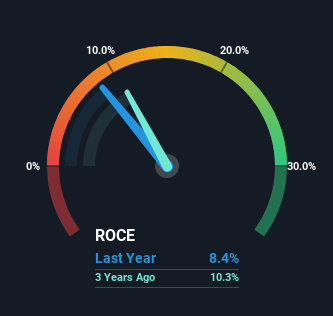- United Kingdom
- /
- Trade Distributors
- /
- AIM:LORD
Return Trends At Lords Group Trading (LON:LORD) Aren't Appealing

If we want to find a potential multi-bagger, often there are underlying trends that can provide clues. Amongst other things, we'll want to see two things; firstly, a growing return on capital employed (ROCE) and secondly, an expansion in the company's amount of capital employed. Put simply, these types of businesses are compounding machines, meaning they are continually reinvesting their earnings at ever-higher rates of return. However, after briefly looking over the numbers, we don't think Lords Group Trading (LON:LORD) has the makings of a multi-bagger going forward, but let's have a look at why that may be.
Return On Capital Employed (ROCE): What Is It?
For those that aren't sure what ROCE is, it measures the amount of pre-tax profits a company can generate from the capital employed in its business. Analysts use this formula to calculate it for Lords Group Trading:
Return on Capital Employed = Earnings Before Interest and Tax (EBIT) ÷ (Total Assets - Current Liabilities)
0.084 = UK£12m ÷ (UK£264m - UK£116m) (Based on the trailing twelve months to December 2023).
Therefore, Lords Group Trading has an ROCE of 8.4%. Ultimately, that's a low return and it under-performs the Trade Distributors industry average of 15%.
View our latest analysis for Lords Group Trading

Above you can see how the current ROCE for Lords Group Trading compares to its prior returns on capital, but there's only so much you can tell from the past. If you'd like to see what analysts are forecasting going forward, you should check out our free analyst report for Lords Group Trading .
What The Trend Of ROCE Can Tell Us
The returns on capital haven't changed much for Lords Group Trading in recent years. The company has consistently earned 8.4% for the last five years, and the capital employed within the business has risen 863% in that time. Given the company has increased the amount of capital employed, it appears the investments that have been made simply don't provide a high return on capital.
On a side note, Lords Group Trading has done well to reduce current liabilities to 44% of total assets over the last five years. This can eliminate some of the risks inherent in the operations because the business has less outstanding obligations to their suppliers and or short-term creditors than they did previously. We'd like to see this trend continue though because as it stands today, thats still a pretty high level.
What We Can Learn From Lords Group Trading's ROCE
In conclusion, Lords Group Trading has been investing more capital into the business, but returns on that capital haven't increased. Since the stock has declined 58% over the last three years, investors may not be too optimistic on this trend improving either. In any case, the stock doesn't have these traits of a multi-bagger discussed above, so if that's what you're looking for, we think you'd have more luck elsewhere.
One final note, you should learn about the 5 warning signs we've spotted with Lords Group Trading (including 1 which is a bit unpleasant) .
While Lords Group Trading may not currently earn the highest returns, we've compiled a list of companies that currently earn more than 25% return on equity. Check out this free list here.
New: AI Stock Screener & Alerts
Our new AI Stock Screener scans the market every day to uncover opportunities.
• Dividend Powerhouses (3%+ Yield)
• Undervalued Small Caps with Insider Buying
• High growth Tech and AI Companies
Or build your own from over 50 metrics.
Have feedback on this article? Concerned about the content? Get in touch with us directly. Alternatively, email editorial-team (at) simplywallst.com.
This article by Simply Wall St is general in nature. We provide commentary based on historical data and analyst forecasts only using an unbiased methodology and our articles are not intended to be financial advice. It does not constitute a recommendation to buy or sell any stock, and does not take account of your objectives, or your financial situation. We aim to bring you long-term focused analysis driven by fundamental data. Note that our analysis may not factor in the latest price-sensitive company announcements or qualitative material. Simply Wall St has no position in any stocks mentioned.
About AIM:LORD
Lords Group Trading
Distributes building materials, plumbing, heating, and DIY goods to local tradesmen, developers, small and medium construction companies, and retail customers.
Adequate balance sheet slight.

